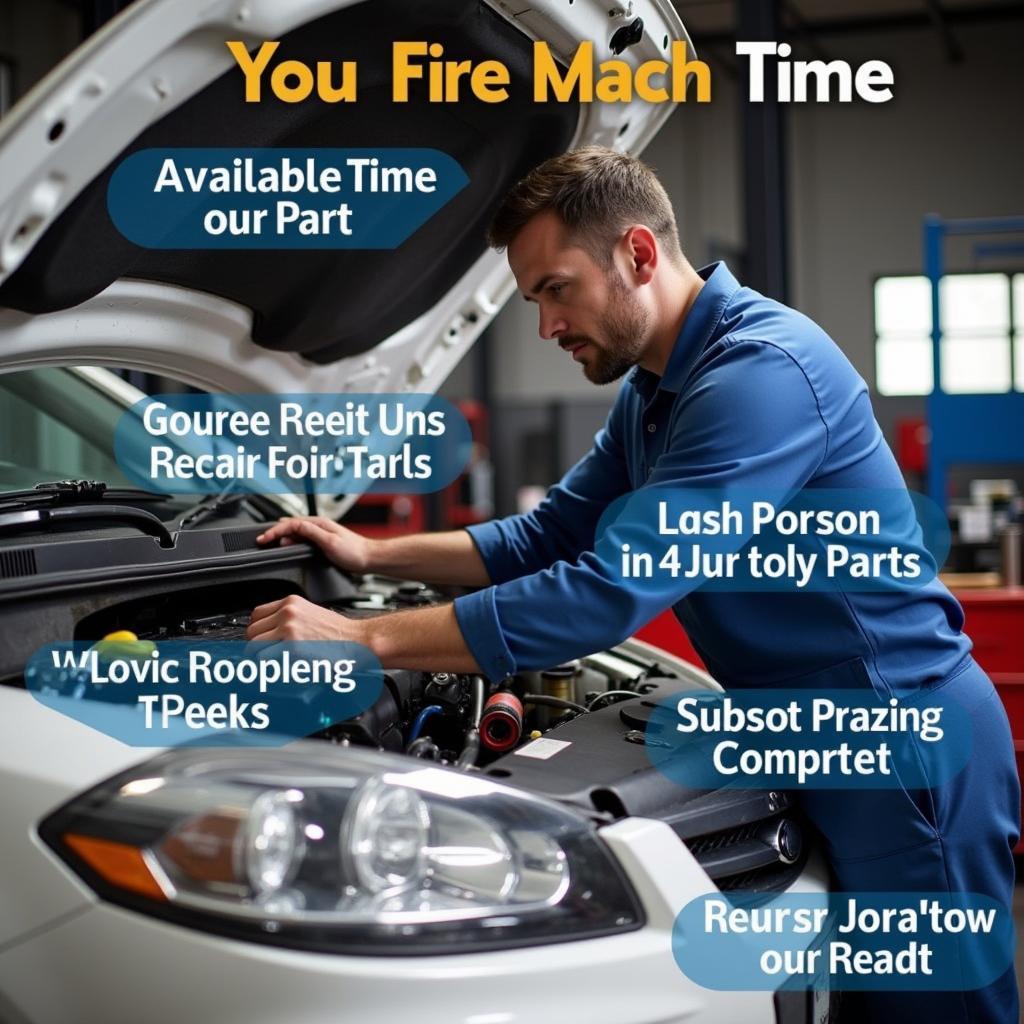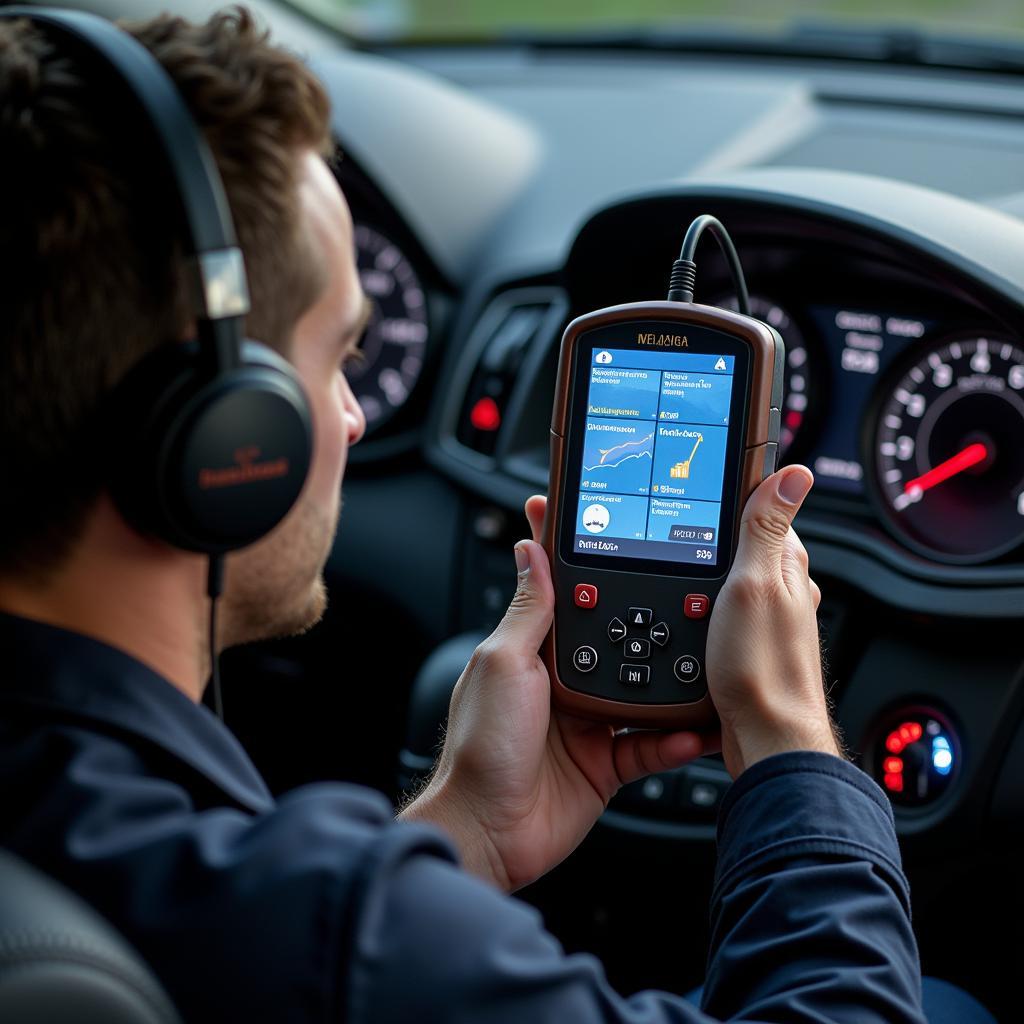Knowing how long a car repair will take is a common question with no easy answer. While some issues are quick fixes, others can have your car stuck in the shop for days or even weeks. Several factors determine the repair timeframe, and understanding these can help you plan and manage expectations.
 Factors Influencing Car Repair Time
Factors Influencing Car Repair Time
Factors Affecting Car Repair Time
Let’s dive into the key elements that influence how long it takes to get your car back on the road:
1. Problem Complexity
It’s no surprise that a simple oil change takes considerably less time than rebuilding a transmission. The complexity of the car repair is a primary factor in determining the timeframe.
- Minor Repairs: Issues like changing a flat tire, replacing wiper blades, or fixing car fog lights can often be resolved within an hour or two.
- Moderate Repairs: Tasks like brake pad replacements, battery replacements, or fixing a faulty alternator may take a few hours to complete.
- Major Repairs: Engine overhauls, transmission repairs, or extensive bodywork can take several days, or even weeks, depending on the severity of the damage.
2. Parts Availability
Sometimes, the repair itself isn’t the most time-consuming part; it’s waiting for the necessary parts to arrive.
- Common Parts: If your car requires common parts readily available from local suppliers, the wait time will be minimal.
- Specialty Parts: Specialty parts or those for less common car models may need to be ordered from manufacturers or distant warehouses, adding days or even weeks to the repair time.
3. Mechanic’s Workload
Even with the parts in hand, a busy auto repair shop means your car might be in a queue.
- Shop Schedule: Call ahead to inquire about the shop’s current workload and estimated wait times.
- Appointment Scheduling: Scheduling an appointment can help minimize wait times compared to simply dropping in.
4. Diagnostic Time
Before any repair can begin, mechanics often need to diagnose the problem accurately.
- Straightforward Issues: A check engine light for a loose gas cap is a quick diagnosis.
- Intermittent Problems: Tracking down the source of electrical problems or strange noises can involve extensive testing and troubleshooting, adding time to the repair.
 Mechanic Performing Car Diagnostics
Mechanic Performing Car Diagnostics
5. Insurance Approval (If Applicable)
If you’re filing an insurance claim for the repairs, the approval process can impact the overall timeframe.
- Communication Delays: Back-and-forth communication between the repair shop, insurance adjuster, and yourself can cause delays.
- Inspection Requirements: The insurance company may need to inspect the damage before approving the repairs, adding extra time.
Estimating Repair Time: Tips for Car Owners
While it’s impossible to provide an exact timeframe without knowing the specifics of your car problem, here are some tips to get a better estimate:
- Provide Detailed Information: When contacting a repair shop, offer a clear and detailed description of the issue you’re experiencing. This helps mechanics provide a more accurate estimate.
- Inquire About Diagnostic Time: Ask how long the diagnostic process typically takes.
- Check Parts Availability: Confirm if the shop has the required parts in stock or if they need to be ordered.
- Request a Realistic Timeline: Once the diagnosis is complete, request a realistic timeline for the repair, factoring in potential delays.
Common Car Repair Timeframes:
While these are rough estimates, they offer a general idea:
- Oil Change: 30 minutes to 1 hour
- Brake Pad Replacement: 1 to 3 hours
- Battery Replacement: 30 minutes to 1 hour
- Alternator Replacement: 2 to 4 hours
- Timing Belt Replacement: 4 to 6 hours
- Engine Overhaul: Several days to weeks
- Transmission Repair/Replacement: Several days to weeks
Communication is Key
Remember, communication is crucial throughout the car repair process. Don’t hesitate to ask questions, clarify any concerns, and request updates from the repair shop. A transparent and communicative relationship with your mechanic can help ensure a smoother repair experience.
how long do insurance take to fix car is another question you might have if you’re dealing with car repairs.
FAQs
Q: Can I drive my car with the check engine light on?
A: It depends on the severity. A flashing check engine light usually indicates a serious problem requiring immediate attention. A solid light might be less urgent, but it’s best to get it checked by a mechanic as soon as possible.
Q: How often should I service my car?
A: Refer to your owner’s manual for recommended service intervals. Generally, it’s a good idea to have your car serviced at least once a year or every 10,000 – 12,000 miles.
Q: Should I choose the cheapest repair estimate?
A: While cost is a factor, it shouldn’t be the only consideration. Opt for a reputable shop with experienced mechanics, even if it means spending a bit more.
Q: How can I prevent future car problems?
A: Regular maintenance, including oil changes, tire rotations, and fluid checks, is crucial for preventing future issues. Address any warning signs or unusual noises promptly.
Q: How long to fix car alignment?
A: It usually takes less than an hour.
Need help with your car troubles? Don’t hesitate to reach out! Contact AutoTipPro at +1 (641) 206-8880 or visit our office at 500 N St Mary’s St, San Antonio, TX 78205, United States. We’re here to assist you.





Leave a Reply